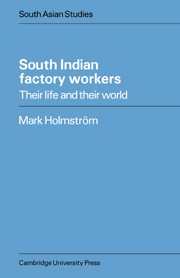Summary
This book is an attempt to develop an anthropology of urban work in India. I have tried to get away from the functionalist idea of bounded groups – factories or neighbourhoods – as systems of relations working towards some kind of balance, and from the oversimplifications of ‘transactional’ theory, towards a more dialectical account of industrial workers' situation, how they see their situation and what they make of it – not merely how they adjust to it, or how it determines their thinking.
Chapter 1 raised some general questions about industrialization (pp. 1–3) and three particular questions about the minority of Indian workers employed in the new ‘organized sector’ factories, (pp. 3–4). In a pilot study there must be a gap between evidence and conclusions: the sample of workers is small but intensively studied, and I have used interviews with managers, statistical and census material and some knowledge of the Indian economic situation. These are my tentative answers to the three questions about the organized sector:
The first was: Who are the factory workers, and are they a privileged élite? This is largely a factual question, about workers' origins and their economic relation to other groups, especially ‘unorganized sector’ workers and country people.
These factory workers come from a wide range of backgrounds, (urban and rural) and castes (including the small Harijan middle class, whose fathers or grandfathers were usually in the army or police), but very few from the poorest groups. Their incomes range with those of clerks and teachers: some of the people called ‘middle class’ in India.
- Type
- Chapter
- Information
- South Indian Factory WorkersTheir Life and their World, pp. 136 - 147Publisher: Cambridge University PressPrint publication year: 1976



